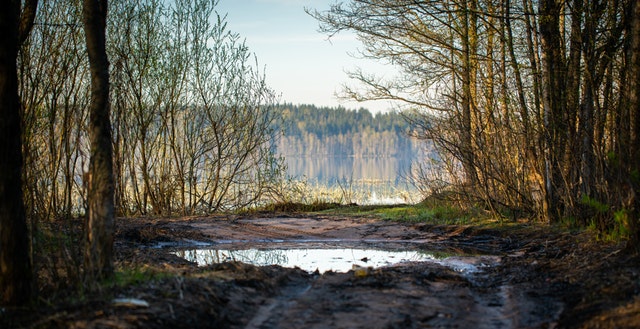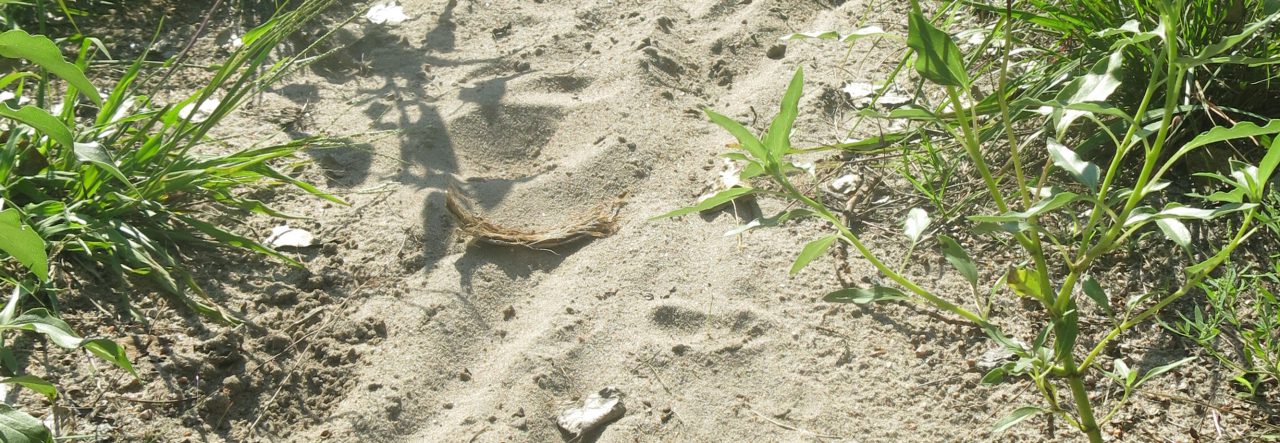A few days before Easter:
I stride in boots down the gravel road that runs past our house, look back at heel prints left in soft dirt. Water and half-melted snow pool in ditches. I scoop up a handful of soggy gravel and smell it, but the peculiar scent of earthy spring is not in the gravel. In the fields, I think. Soon. I twist my boot on its heel, grinding it into mud and loving it. Easter will be here soon. And Jesus lives in mud.
A few nights before Easter:
One of those rare nights when, due to a spring snowstorm and cancelled plans, all eight of us are home and in one place. My two sisters spread fabric down the center of the living room floor to cut out dress pieces for sewing. My brothers and I sprawl on the couches and chairs, each in our separate world of computer or Kindle or old-fashioned book.
“Righteous people don’t need Jesus to get to God,” I announce, into the center of them.
They jerk up and look at me. In my evangelical Christian family, such a statement is scandalous.
“It’s true. Jesus said, ‘I came not to call the righteous, but sinners to repentance.’”
They argue with me. “You’re taking that verse out of context.”
“No, I’m not. That’s what it says. Righteous people don’t need Jesus.”
“But nobody’s righteous.”
“But some people think they’re righteous.”
Understanding lights one sister’s eyes. “She’s talking about people like the Pharisees.”
“See? She understands what I mean.”
They are suspicious. “So you’re just saying that some people are self-righteous and think they don’t need Jesus?”
“I’m saying that some people think they don’t need Jesus, and so they don’t need him.”
My brother is disgusted. “Way to make something simple into something complicated.”
But I know that for myself, I am making something complicated into something simple.
Something complicated:
I used to be confused by Jesus, because I viewed him as a sort of Holy Wizard pointing to heaven. “Believe on me, or be damned.” The little phrases found on the back of every evangelical tract–“ask Jesus into your heart,” “accept Christ as your personal Savior”–I unconsciously thought of as magical incantations. “Utter these words in this order and Voila! you’re saved.” Jesus seemed to me the height of unfairness. What about the people who hadn’t heard, or those who were deeply rooted in other religions? Were they to be damned because of where they were born?
But that was before I began to observe this whole sodden mass of humanity, before I began to identify with us and to realize the sorry state we are in. Whatever our race, nationality, financial status, or religion, we are driven by a basic selfishness. Not one of us lives up to our own idea of what is good. We are covered in sorrow.
We have no need of a Holy Wizard to damn us. We are already damned.
Vienna, the Rabbit Girl:
I met Vienna at a recent bridal shower. She wore a sheer black top, a short glittery mauve skirt, black hose. She had a small silver ring in her nose and tiny silver studs on either side of her eyes, which were made up in heavy black to appear slanted, like cat’s eyes. She told me she wore heavy make-up to cover the scars of a face that had been badly mauled. She was friendly, vivacious, intelligent.
I met Vienna’s boyfriend, also, before the shower. He asked me questions about being a Mennonite and told me that he also had a Christian background. “I might be living in sin now,” he said, “but I’ve heard that if you pray, even on your deathbed, you’ll be okay.”
He explained to me that living that sort of good life the Bible talked about was just too hard in this modern world–foreign, like living on Mars–and asked if I understood.
I did.
But, Vienna, who made no profession of Christianity, I liked better. About halfway through the event, she asked if I would ever be interested in getting a body piercing.
“No,” I said.
“But would you be interested in knowing why someone else might do it?”
“Oh, yes.”
So she told me how she did it to identify with a subculture, something outside the media. She told me how each of her piercings was significant, that they were a sort of sacrifice given for loved ones who had died, and a way of connecting to these loved ones whose spirits were in the stars. I understood. My Mennonite way of dress is also significant.
There was alcohol available at the shower. Some drank a glass or two. Vienna drank many. By the end of the evening, she had lost her intelligence and become silly, emotional, and random. She told me all about her Giant Flemish rabbit, which stood as high as a Shetland sheepdog. She lay on her back with her legs in the air to show how it looked when it wanted to have its belly scratched, and demonstrated its “murrs” and its guttural noises repeatedly. Out on the porch, she told me, with feeling, “I love you. I will love you for the rest of my life.” I pulled a blank and stood there while she waited and her eyes got large. After a while she said something about a squirrel and laughed and went into the house.
Someone turned on the television. Rioting in the city. Our host, a gentle young mother of two, walked up to the screen and pointed it away from herself. “I’ll be fine, as long as I don’t have to look at that.”
I think of the gentle host, and of Vienna with her body piercings and her hurts from the past, and the boyfriend, and the rioters on the television, and myself–and I think of us as one large, breathing mass of humanity. We struggle for good; we are surrounded, crushed in, and attracted by evil. They are two in us–the good and the evil–warring, and we wonder if the good ever wins, or if it is always the evil.
We are one with the young man who stares down depression, one with the starving black-eyed baby who will not stop crying, one with the girl-child sold into prostitution. We are one with the cowering woman beaten into submission, and one with the gray eyed maniac who beats her. This is Vienna; this is I; and this is Jesus, who lives in the mud.
Something simple:
I realize now that Jesus is not a Holy Wizard, come down to save the people born into the right time and the right place and the right religion. He is not a magical incantation uttered from a book; he is not three simple steps to salvation. He is someone who stepped into a need greater than the world and said, “I have a solution.”
The righteous, or those who think they are righteous, will not see a need for Jesus. But Jesus never came for the righteous people.
He came for those who are succumbing to evil and don’t know how to stop. He came for those who long for God and don’t know how to reach him. He came for those who are sick to death of their own sin and can find no religion to help them conquer it. He came to be the hope in the young man’s eye, the future of the starving black-eyed child, the avenger of the girl prostitute, the comfort of the cowering woman, the regeneration of the wife beater.
This is Jesus, who sees no sin too great, no hurt too deep. Jesus who transforms lives, breaks iron chains, casts demons down to the depths of hell. Jesus, who fulfills my God-longing and opens the doorway to spiritual life.
This is Jesus, who is everything–my alcohol, my sports craze, my lover, my drug.
This is Jesus, who lives in mud.

Lucinda Miller blogs at Properties of Light, and her posts are a delightful combination of excellent writing and photography. I like how she is honest about her questions and doubts while writing about her deep-seated faith. Lucinda wrote a book, Anything But Simple, about growing up Mennonite. (I haven’t read it yet, but would love to!) This post was originally published on Properties of Light, and is used here by permission.
I chose this post because this season of Lent reminds me how I am made of dust, how I cannot measure up to a holy God no matter how much I try. But God comes down to the mud, and by His mercy lifts me up.
How is Jesus meeting you in the lowliest places of your life right now?
This concludes my series of guest posts for now. I have enjoyed giving others a chance to speak here. I hope they have brought you some things to think about during this long and cold winter. Which posts resonated with you, and why?

Yes yes YES!!!
LikeLiked by 1 person
Beautifully written! Growing up ‘righteous’ can make it difficult to recognize the Jesus in the mud. But He is There, and He is Real.
LikeLike
Yes, He is, and I’m so thankful!
LikeLike
Wow. We have no need of a Holy Wizard to damn us. We are already damned. Amen!
LikeLike
As the years go by, I see more and more how weak and undone I truly am.
LikeLike